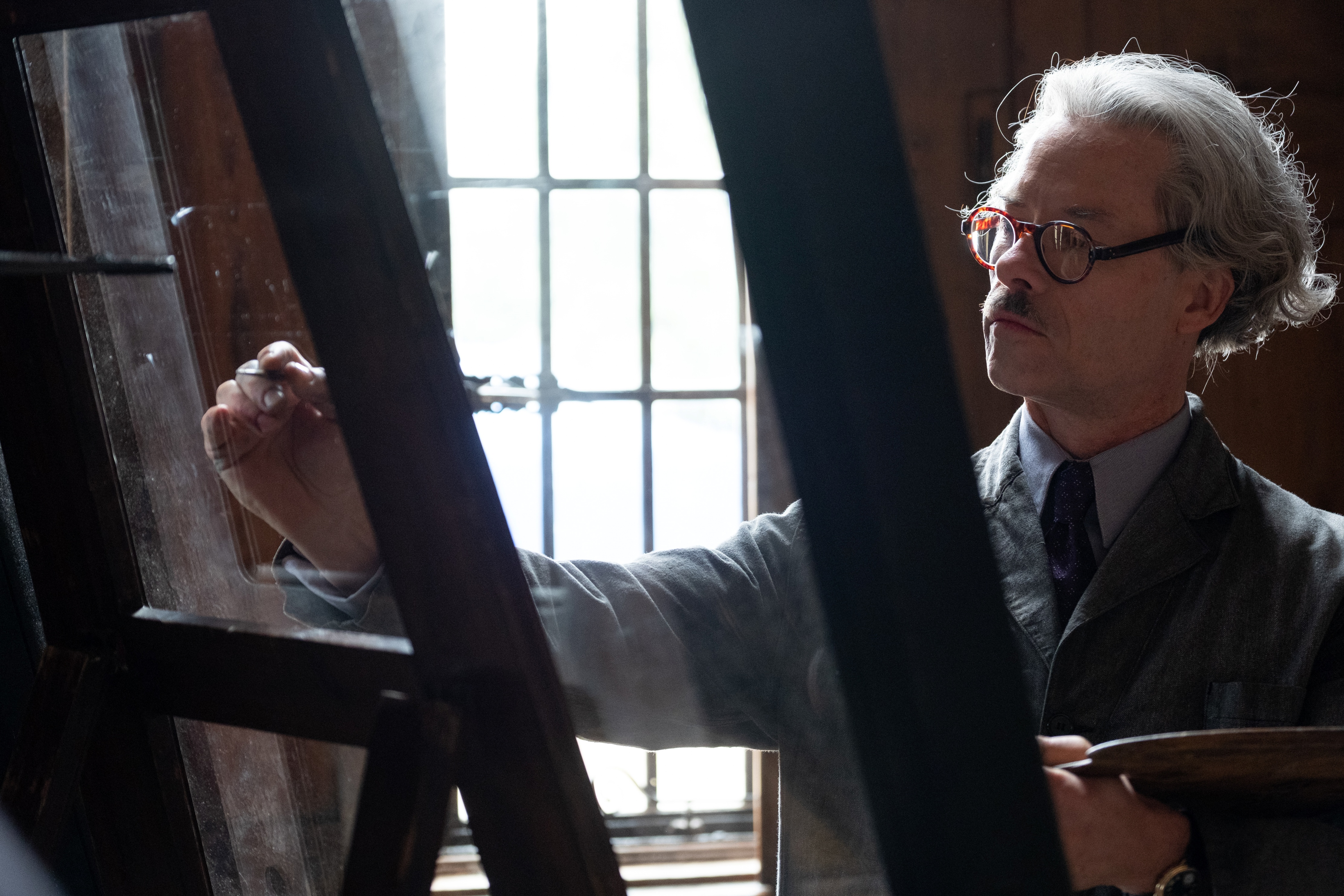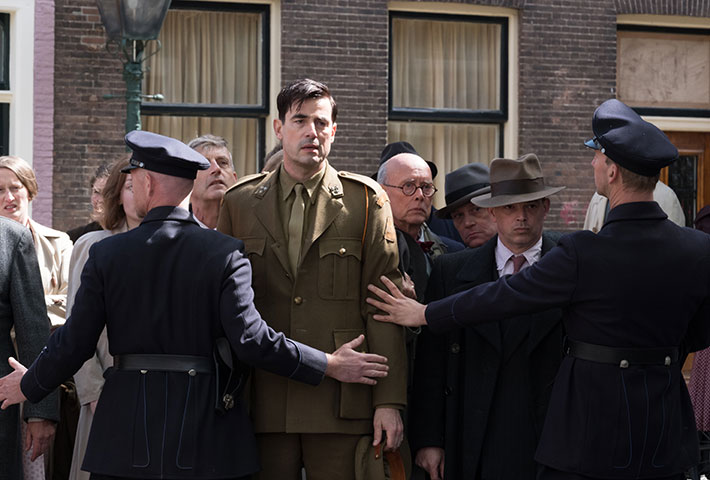Last Vermeer, The (United States, 2019)
November 24, 2020
The Last Vermeer is something of an old-fashioned courtroom melodrama, complete with impassioned speeches, a sneering prosecutor, an antagonistic judge, and a last-minute gotcha! For those who enjoy this kind of “it only happens in the movies” version of jurisprudence, The Last Vermeer delivers. (Although based on real events and real people, the trial proceedings are mostly invented by the screenwriters. They did not rely on a court transcript when writing their fiction-is-stranger-than-truth scenes.) While the legal stuff provides the film’s crowd-pleasing element, some of the foundational building blocks give The Last Vermeer a little heft, elevating it to a level where one is almost tempted to call it a quasi-art house production.
In the wake of a revolution or a liberation, there is sometimes a period of mob rule in which the former victims, drunk with the new power of freedom, visit upon their oppressors the same kind of viciousness that they previously received. No quarter, no mercy, no forgiveness – only retribution. That’s the context of The Last Vermeer – a post-World War II story that illustrates (at least in part) the ugly fate of those who, having collaborated with the Germans during the height of Nazi power, lost their power, their reputations, and (in some cases) their lives once the Allies arrived. One scene in particular illustrates this, helping to explain the determination of Captain Joseph Piller (Claes Bang) to defend his prisoner, Han van Meegeren (Guy Pearce) from members of the new Netherlands government, who would like nothing better than to see van Meegeren found guilty of collaboration and shot.
 Piller’s story is straightforward. A Jew, he joined the Dutch
Resistance and went underground while his wife remained behind to fraternize
with the enemy and provide actionable intelligence. Now that the war is over,
Piller is an officer in the Allied reconstruction corps. His job calls for him
to investigate possible links between high-priced art sales and espionage; this
leads him to van Meegeren, a flamboyant failed artist-turned-art dealer who
readily admits to having sold a Vermeer to Hermann Göring – but there’s a
twist. According to van Meegeren, the masterpiece was a forgery, painted by van
Meegeren himself. He wasn’t collaborating with the Nazis, he was defrauding
them.
Piller’s story is straightforward. A Jew, he joined the Dutch
Resistance and went underground while his wife remained behind to fraternize
with the enemy and provide actionable intelligence. Now that the war is over,
Piller is an officer in the Allied reconstruction corps. His job calls for him
to investigate possible links between high-priced art sales and espionage; this
leads him to van Meegeren, a flamboyant failed artist-turned-art dealer who
readily admits to having sold a Vermeer to Hermann Göring – but there’s a
twist. According to van Meegeren, the masterpiece was a forgery, painted by van
Meegeren himself. He wasn’t collaborating with the Nazis, he was defrauding
them.
A core of anger burns deep within van Meegeren and the root of his cause provides fodder for consideration. What constitutes great art? Why are some painters regarded as masters and others with arguably equal skills, dismissed? Van Meegeren blames art critics and other similar “experts.” He claims that his chance at fame was stolen from him because he refused to seek their approval. He takes solace that he is able to pull the wool over their eyes and have them fawn over his fake Vermeers.
Piller and van Meegeren are polar opposites – a study in contrasts. The former is rigidly formal with strong beliefs about what’s right and wrong. He doesn’t bend to the wind or seek an easier path. The latter, on the other hand, is bold and theatrical. Van Meegeren is amoral and the viewer has little trouble accepting that, under the right circumstances, he might have cozied up to Göring (or even Hitler) if it served his purposes. He’s charming and charismatic and is able to gain Piller’s advocacy by manipulating the Captain’s deep sense of law & order.
 The Last Vermeer is as much about personalities and
performances as it is about the clumsily constructed story. The narrative is
scattershot, failing to flesh out Piller as strongly as it should. His
quasi-romantic relationship with a co-worker (played by Vicky Krieps) is bungled;
its resolution is confusing and poorly motivated. Actor Claes Bang handles the
somewhat thankless job of portraying Piller with unimpeachable aplomb,
understanding that he is playing second fiddle to Guy Pearce. Actors love colorful
roles like van Meegeren and Pearce inhabits this one with relish. In the
strange year of 2020, it’s impossible to handicap any Oscar race but this is
the kind of portrayal the Academy often delights in. Worthiness,
however, may not be a key factor at a time when politics and a pandemic have
altered the awards terrain.
The Last Vermeer is as much about personalities and
performances as it is about the clumsily constructed story. The narrative is
scattershot, failing to flesh out Piller as strongly as it should. His
quasi-romantic relationship with a co-worker (played by Vicky Krieps) is bungled;
its resolution is confusing and poorly motivated. Actor Claes Bang handles the
somewhat thankless job of portraying Piller with unimpeachable aplomb,
understanding that he is playing second fiddle to Guy Pearce. Actors love colorful
roles like van Meegeren and Pearce inhabits this one with relish. In the
strange year of 2020, it’s impossible to handicap any Oscar race but this is
the kind of portrayal the Academy often delights in. Worthiness,
however, may not be a key factor at a time when politics and a pandemic have
altered the awards terrain.
By its title and subject matter, The Last Vermeer may seem to hold little attraction for anyone without an art history degree. In actuality, however, it has been mounted with as much mainstream appeal as one can imagine from a story set during this turbulent time. Although there are no true villains, the system itself is a reasonable stand-in and the courtroom proceedings are riveting (if artificial). The film’s historically accurate underpinning (van Meegeren was a real forger who did indeed sell a fake Vermeer to Göring) gives it a unique quality; the end result is an entertaining if uneven mixture of post-World War II fact and fiction.
Last Vermeer, The (United States, 2019)
Cast: Guy Pearce, Claes Bang, Vicky Krieps, Roland Moller, August Diehl, Olivia Grant
Home Release Date: 2021-02-23
Screenplay: James McGee, Mark Fergus, Hawk Ostby, based on the book “The Man Who Made Vermeers” by Jonathan Lopez
Cinematography: Remi Adefarasin
Music: Johan Soderqvist
U.S. Distributor: TriStar Pictures
U.S. Release Date: 2020-11-20
MPAA Rating: "R" (Violence, Profanity, Nudity)
Genre: Thriller/Drama
Subtitles: none
Theatrical Aspect Ratio: 1.85:1
- Northman, The (2022)
- (There are no more better movies of Claes Bang)
- Phantom Thread (2017)
- (There are no more better movies of Vicky Krieps)
- Old (2021)
- Girl in the Spider's Web, The (2018)
- (There are no more worst movies of Vicky Krieps)

Comments